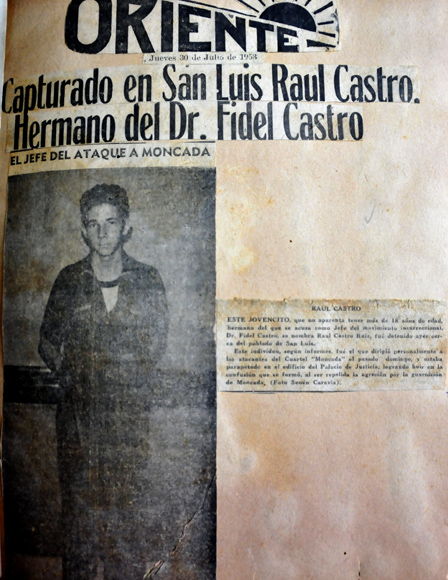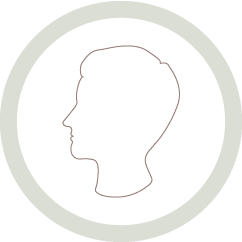|
Raúl Castro
Raúl Modesto Castro Ruz ( ; ; born 3 June 1931) is a Cuban retired politician and general who served as the First Secretary of the Communist Party of Cuba, first secretary of the Communist Party of Cuba, the most senior position in the One-party state, one-party communist state, from 2011 to 2021, and President of Cuba between 2008 and 2018, succeeding his brother Fidel Castro. One of the military leaders of the Cuban Revolution, Castro served as the minister of the Cuban Revolutionary Armed Forces, Armed Forces from 1959 to 2008. His ministerial tenure made him the longest-serving minister of the armed forces. Castro was also a member of the Politburo of the Communist Party of Cuba, the highest decision-making body, from 1965 until 2021. Because of his brother's illness, Castro became the acting (law), acting President of Cuba, president of the Council of State (Cuba), Council of State in a temporary 2006 Cuban transfer of power, transfer of power from 31 July 2006. Castro wa ... [...More Info...] [...Related Items...] OR: [Wikipedia] [Google] [Baidu] |
First Secretary Of The Communist Party Of Cuba
The First Secretary of the Central Committee of the Communist Party of Cuba is the Supreme leader, top leader of Cuba. The First Secretary is the highest office within the Communist Party of Cuba as well as ranking first in the Politburo of the Communist Party of Cuba, Politburo, the highest decision-making body in Cuba, which makes the office holder the most powerful person in the Cuban government. In communist states the General Secretary of the Communist Party, First or General Secretary of the Communist Party is typically the ''de facto'' leader of the country and a more powerful position than state offices such as President of Cuba, President (head of state) or Prime Minister of Cuba, Prime Minister (head of government), when those positions are held by different individuals. The officeholder of the post of first secretary presides over the work of the Central Committee of the Communist Party of Cuba, Central Committee of the Communist Party of Cuba (PCC), which is designated ... [...More Info...] [...Related Items...] OR: [Wikipedia] [Google] [Baidu] |
Birán
Birán is a village in Holguín Province of Cuba, hamlet and ''consejo popular'' of Cueto, best known as the birthplace of Ramón, Fidel, Raúl and Juanita Castro. Their father Ángel Castro y Argiz owned a plantation there. History Until the 1976 municipal reform, the village was part of the neighboring municipality of Mayarí. A farm in Birán was the birthplace of former Cuban revolutionary leaders Ramón Castro Ruz, Fidel Castro, Raúl Castro and their sister Juanita Castro. Geography It is located south-west of Mayarí and south of Cueto, in the foothills of the Nipe Mountains (''Sierra de Nipe''). See also *Nicaro-Levisa *Guatemala Guatemala, officially the Republic of Guatemala, is a country in Central America. It is bordered to the north and west by Mexico, to the northeast by Belize, to the east by Honduras, and to the southeast by El Salvador. It is hydrologically b ... (village) References Populated places in Holguín Province Fidel Cas ... [...More Info...] [...Related Items...] OR: [Wikipedia] [Google] [Baidu] |
Cuban Revolution
The Cuban Revolution () was the military and political movement that overthrew the dictatorship of Fulgencio Batista, who had ruled Cuba from 1952 to 1959. The revolution began after the 1952 Cuban coup d'état, in which Batista overthrew the emerging Cuban democracy and consolidated power. Among those who opposed the coup was Fidel Castro, then a young lawyer, who initially tried to challenge the takeover through legal means in the Cuban courts. When these efforts failed, Fidel Castro and his brother Raúl Castro, Raúl led an armed Attack on the Moncada Barracks, assault on the Moncada Barracks, a Cuban military post, on 26 July 1953. Following the attack's failure, Fidel Castro and his co-conspirators were arrested and formed the 26th of July Movement (M-26-7) in detention. At his trial, Fidel Castro launched into a History Will Absolve Me, two-hour speech that won him national fame as he laid out his grievances against the Batista dictatorship. In an attempt to win pub ... [...More Info...] [...Related Items...] OR: [Wikipedia] [Google] [Baidu] |
Attack On The Moncada Barracks
The Moncada Barracks were military barracks in Santiago de Cuba, Cuba named after General Guillermo Moncada, a hero of the Cuban War of Independence. On 26 July 1953, the barracks was the site of an armed attack by a small group of revolutionaries led by Fidel Castro. That day a simultaneous attack was carried out on the Carlos M. de Cespedes Barracks in Bayamo directed by Raúl Martínez Ararás by order of Castro. The attack failed and the surviving revolutionaries were imprisoned. This armed attack is widely accepted as the beginning of the Cuban Revolution. The date on which the attack took place, 26 July, was adopted by Castro as the name for his revolutionary movement, Movimiento 26 Julio (abbreviated as M-26-7), which eventually toppled the dictatorship of Fulgencio Batista on 1 January 1959. Preparation Almost all of Fidel Castro's followers were Partido Ortodoxo Youth rank and file of the lower middle class and working class. Of the 137 insurgents whose ages are kn ... [...More Info...] [...Related Items...] OR: [Wikipedia] [Google] [Baidu] |
Associated Press
The Associated Press (AP) is an American not-for-profit organization, not-for-profit news agency headquartered in New York City. Founded in 1846, it operates as a cooperative, unincorporated association, and produces news reports that are distributed to its members, major U.S. daily newspapers and radio and television broadcasters. Since the award was established in 1917, the AP has earned 59 Pulitzer Prizes, including 36 for photography. The AP is also known for its widely used ''AP Stylebook'', its AP polls tracking National Collegiate Athletic Association, NCAA sports, sponsoring the National Football League's annual awards, and its election polls and results during Elections in the United States, US elections. By 2016, news collected by the AP was published and republished by more than 1,300 newspapers and broadcasters. The AP operates 235 news bureaus in 94 countries, and publishes in English, Spanish, and Arabic. It also operates the AP Radio Network, which provides twice ... [...More Info...] [...Related Items...] OR: [Wikipedia] [Google] [Baidu] |
Cuban Revolutionary Armed Forces
The Cuban Revolutionary Armed Forces (; FAR) are the military forces of Cuba. They include Cuban Revolutionary Army, Revolutionary Army, Cuban Revolutionary Navy, Revolutionary Navy, Cuban Revolutionary Air and Air Defense Force, Revolutionary Air and Air Defense Force, and other paramilitary bodies including the Territorial Troops Militia ( – MTT), Youth Labor Army ( – EJT), and the Defense and Production Brigades ( – BPD), plus the Civil Defense Organization ( – DCC) and the National Reserves Institution ( – INRE). All these groups are subordinated to the Ministry of the Revolutionary Armed Forces (Cuba), Ministry of the Revolutionary Armed Forces ( – MINFAR). The armed forces have long been the most powerful institution in Cuba. The military manages many enterprises in key economic sectors representing about 4% of the Cuban economy. The military has also served as former Communist Party of Cuba, Cuban Communist Party First Secretary of the Communist Party of Cuba, ... [...More Info...] [...Related Items...] OR: [Wikipedia] [Google] [Baidu] |
Cuba
Cuba, officially the Republic of Cuba, is an island country, comprising the island of Cuba (largest island), Isla de la Juventud, and List of islands of Cuba, 4,195 islands, islets and cays surrounding the main island. It is located where the northern Caribbean Sea, Gulf of Mexico, and Atlantic Ocean meet. Cuba is located east of the Yucatán Peninsula (Mexico), south of both Florida and the Bahamas, west of Hispaniola (Haiti/Dominican Republic), and north of Jamaica and the Cayman Islands. Havana is the largest city and capital. Cuba is the List of countries and dependencies by population, third-most populous country in the Caribbean after Haiti and the Dominican Republic, with about 10 million inhabitants. It is the largest country in the Caribbean by area. The territory that is now Cuba was inhabited as early as the 4th millennium BC, with the Guanahatabey and Taino, Taíno peoples inhabiting the area at the time of Spanish colonization of the Americas, Spanish colonization ... [...More Info...] [...Related Items...] OR: [Wikipedia] [Google] [Baidu] |
Juanita Castro
Juana de la Caridad "Juanita" Castro Ruz ( , ; 6 May 1933 – 4 December 2023) was a Cuban-American activist and writer, as well as the sister of Fidel and Raúl, both former presidents of Cuba, and Ramón, a key figure of the Cuban Revolution. After collaborating with the Central Intelligence Agency in Cuba in 1964, she lived in the United States until her death. Early life Juana de la Caridad Castro Ruz was born in Birán, near Mayarí, in what is now known as the province of Holguín on 6 May 1933. She was the fourth child of Ángel Castro y Argiz and Lina Ruz González and had three brothers — Ramón, Fidel, and Raúl — and three sisters — Angelita, Emma, and Agustina. Lina Ruz González was Ángel Castro's cook; he was married to another woman when Juanita and her older brothers were born. Castro also had five half-siblings: Lidia, Pedro Emilio, Manuel, Antonia, and Georgina, who were raised by Ángel Castro's first wife Maria Luisa Argota, as well as another h ... [...More Info...] [...Related Items...] OR: [Wikipedia] [Google] [Baidu] |
Ramón Castro Ruz
Ramón Eusebio Castro Ruz ( , ; 14 October 1924 – 23 February 2016) was a Cuban revolutionary, activist and farmer. He was the eldest brother of Fidel and Raúl Castro and a key figure of the early days of the Cuban Revolution. He kept a much lower profile than his brothers throughout his life, focusing on agriculture. Biography Ramón, the eldest of the Castro brothers, the son of Ángel Castro, a Spanish-born rancher, and his second wife, Lina Ruz, grew up on his family's large farm in Birán, Holguin province, in eastern Cuba. Ramon Castro, who studied agricultural engineering, spent his life tending crops and livestock. He oversaw Cuba's sugar production in the 1960s to help increase output, and he founded several state companies handling production and transport of food crops. He also participated in agricultural research. "Physically, he is stunningly like his brother Fidel, an enormous, heavy-set, gruff bear of a man, with a scraggly beard, a red face, a blustery mann ... [...More Info...] [...Related Items...] OR: [Wikipedia] [Google] [Baidu] |
Ángel Castro Y Argiz
Ángel María Bautista Castro y Argiz (, 5 December 1875 – 21 October 1956) was a Spanish-born Cuban farmer and businessman who was the father of Cuban leaders Fidel, Raúl and Ramón Castro. Early life Ángel Castro was born in Láncara, in a small fieldstone house typical of the poor Galician peasants of that time,Ramonet, Ignacio, ''Fidel Castro: My Life''. Penguin Books: 2007 to Manuel de Castro y Núñez (Láncara, – Láncara, 12 June 1903) and Antonia Argiz y Fernández (Láncara, 1857 – Láncara, 16 November 1887), who had married in Láncara on 16 August 1873. When he was sixteen or seventeen, he was conscripted into the Spanish military, and came to Cuba during the second War of Independence. He was stationed in the tract of land between Júcaro and Morón. Following the Spanish defeat in 1898, Castro went with the army back to Spain and returned to Láncara. A cavalryman in the Spanish Army with no future he finally decided having fought for ... [...More Info...] [...Related Items...] OR: [Wikipedia] [Google] [Baidu] |
Alejandro Castro Espín
Alejandro Castro Espín (born 29 July 1965) is a Cuban political and military figure. He holds the rank of Brigadier General in the Interior Ministry of Cuba. He is the only son of Raúl Castro, the former First Secretary of the Communist Party of Cuba, and Vilma Espín, one of the main leaders of the Cuban Revolution; he is a nephew of Fidel Castro. Biography Alejandro was born on 29 July 1965. He is the only son of the marriage between Raúl Castro and Vilma Espín (1930–2007), and brother of Deborah, Mariela and Nilsa. His sister Mariela is one of the country's most prominent sexologists, and also director of the National Center for Sex Education in Cuba. He participated in the Cuban contingent sent by his government to the Angolan Civil War, and although he did not fight on the front line, he had an accidental injury to an eye (no eye loss) during a military exercise in Luanda, Angola. This injury earned him the nickname "The One-Eyed" () among Cuban dissidents. Alej ... [...More Info...] [...Related Items...] OR: [Wikipedia] [Google] [Baidu] |
Mariela Castro
Mariela Castro Espín (born 27 July 1962) is the director of the Cuban National Center for Sex Education in Havana, as well as the National Commission for Comprehensive Attention to Transsexual People, and an activist for LGBT rights in Cuba. Castro is an outspoken advocate for the LGBT+ community as well as dissolving some of the antiquated stigmas and stereotypes that surround the community. She is the daughter of former Communist Party First Secretary Raúl Castro and feminist and revolutionary Vilma Espín, and the niece of former First Secretary Fidel Castro. Early life Mariela Castro is the daughter of former Communist Party First Secretary Raúl Castro and feminist and revolutionary Vilma Espín, and the niece of former First Secretary and prominent Cuban revolutionary Fidel Castro. She has a brother, Alejandro Castro Espín. Castro states that as a child, she grew up in a homophobic society where members of the LGBT+ community were targeted relentlessly in terms of ... [...More Info...] [...Related Items...] OR: [Wikipedia] [Google] [Baidu] |





